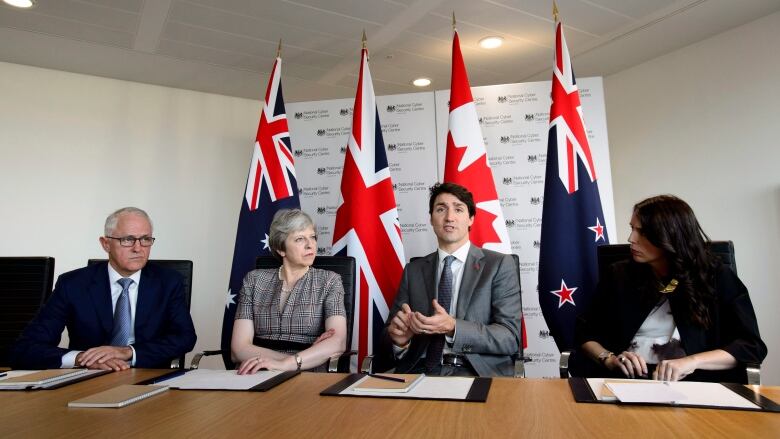Trudeau talks Russian cyberattacks with Five Eyes counterparts
Top of the list of issues that were discussed were cyberattacks, particularly those carried out by Russia

Prime Minister Justin Trudeau joined counterparts from Britain, Australia and New Zealand on Wednesday to present a united global front against the most pressing security challenges facing their countries and the international order.
Top of the list: cyberattacks, particularly those conducted by Russia.
The call to arms came as the four leaders, who together represent along with the U.S. the tight-knit security and intelligence partnership known as the Five Eyes, gathered for a top-secret intelligence briefing in London.
The meeting coincided with a warning from the U.S. and U.K. this week that Russia has been involved in an unprecedented level of cyber-infiltration and attacks, which includes targeting the routers that many people use at home.
British Prime Minister Theresa May, who convened the briefing, wasted no time turning her guns on Russia, which she accused of "using cyber as part of a wider effort to attack and undermine the international system."
Those attacks have been stepped up, she added, alongside a concerted disinformation campaign following last month's poisoning of a former Russian spy and his daughter in the British city of Salisbury.
Britain and its allies have blamed Moscow for the poisoning, which they say was conducted using a military-grade nerve agent, though the Kremlin has denied any involvement.
"We know what it's doing, and we should be in no doubt that such cyberwarfare is one of the greatest challenges of our time," May said before the four leaders went behind closed doors at Britain's National Cyber Security Centre.
"And working with our closest allies, three of whom are here today, we will work around the clock with all the technology at our disposal to stop aggressive states and non-state actors from succeeding."
Cybersecurity in Canada
The other three leaders also reaffirmed their commitment to working together to protect against cyberattacks and, more broadly, defend the system of rules and norms they credited for decades of peace, stability and prosperity.
"There are folks out there in the world, countries out there in the world who do not share our values and our approach to freedoms and mostly the rules-based order," Trudeau told the others.
"So the importance of like-minded friends and partners like us four to stand togetherprovides a response and a solidarity that is a clear message to those around the world who do not play by the same rules."
Even so, while Canada has taken Russia to task for spreading disinformation and interfering in the domestic politics of countries like Ukraine, officials have been relatively silent about whether Canadians should be worried about Russian hackers trying to get into their computers.
Asked after the intelligence briefing about the threat posed by Russia to routers and other personal devices, Trudeau said the federal government and its Communications Security Establishment take cybersecurity seriously.
"The CSE is an extraordinary institution that is doing great work to keep Canadians safe and we're going to continue to make sure that Canadians are apprised about any extra measures they need to take," he said in an interview.
"We continue to be on it."
In its last budget in February, the Liberal government promised $507 million over five years as it fleshes out its cybersecurity strategy, with much of the money going to the CSE to create a federal cybersecurity centre.
The government has also proposed new powers for the signals intelligence agency that would allow it to conduct offensive cyber operations, rather than simply defend against attacks.












_(720p).jpg)


 OFFICIAL HD MUSIC VIDEO.jpg)
.jpg)



























































































